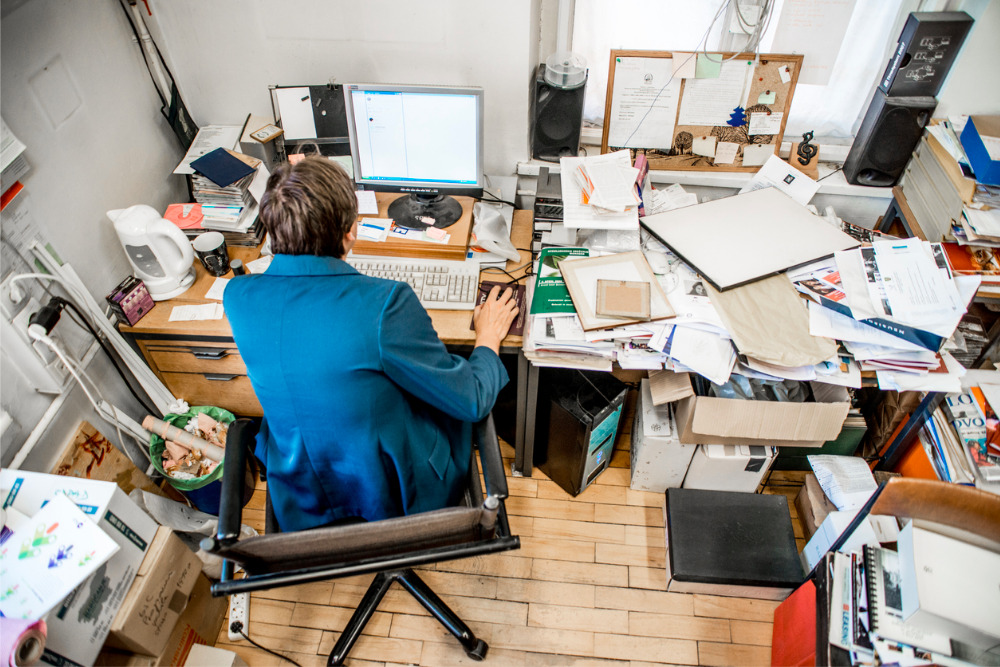What a Messy Office Says About You and Your Business

Doing business can be chaotic, to say the least. People are continually coming and going from the office, piles of paper pile up, and everyone is trying to use the space for their work needs. More often than not, the result is a messy workspace with trash cans overflowing with paper, debris all over the place, and boxes piled up high. It isn’t exactly a great look. What exactly does a messy office say about you and your business?
You might think that a messy office doesn’t matter that much. But when you do a little digging into the science, you soon find out that it makes a heck of a difference.
Research from office solutions company CMD shows that first impressions matter. When visiting an office, 33.9 percent of people interviewed said that a cluttered workspace was the biggest turnoff – worse than poorly dressed staff or even a lack of natural light.
- How a Messy Office Might be Affecting Your Business
- Some May Think You are Neurotic (Even if you are not)
- You Don't Care About Your Product or Service
- Potential Employees May Think You are Unprofessional
- You Don't Care About Your Staff
- You Are Creative But Can't Deliver
- You May Lack Impulse Control
- You Have A Culture Of Stress
- You're Pretending To Be Busy
How a Messy Office Might be Affecting Your Business
What’s more, the results indicate that the problem of clutter is even more important to women, with 39.3 percent telling CMD researchers that messy workspaces were the number one thing that gave them a negative impression. Slovenly, smelly and generally unkempt members of staff were a distant second at just 26.3 percent.
Clean workspaces are the most critical issue for people visiting offices. Almost all other considerations – even dated decor from the 70s – are secondary.
Some May Think You are Neurotic (Even if you are not)

Nobody likes to be called neurotic. But there’s an increasing body of evidence which suggests that if you have a messy office, you’re more likely to be worried about what other people think about you.
Researchers from the University of Michigan randomly assigned 160 participants to two groups. The first would view a messy office and the others, one that was perfectly clean.
The neat office was a beautiful sight. All of the papers were stacked in neat rows, the trash cans were freshly emptied, and the carpets were clean. It was, in many ways, the perfect workspace.
The messy office was completely different. There were papers all over the floor, things looked dirtier, and desks were cluttered. It had an entirely different feel.
The participants then had to make a judgment about what they thought of the owners of both of the offices. The researchers created a scale for four major personality traits: conscientiousness, openness, social grace, and neuroticism, and got the students to rank the office owners.
The results were what you might expect for the owner of the messy office. Participants saw that person as being less conscientious, less socially able, and less hardworking. But interestingly, they also perceived them as more neurotic, regardless of whether they were or not.
You Don’t Care About Your Product or Service

You might think that having a messy office would be an indication that you’re feverishly doing everything you can to please your clients. But this is rarely how they perceive it.
Piles of clutter might seem to you like the inevitable byproducts of meeting your client’s needs, but to them, it just looks like plain old-fashioned disorganization.
This is, unfortunately, a problem. A client who visits your office and sees that things are not in ship-shape will unconsciously use that information to judge your products. If you can’t keep your office in order, then what hope do you have of providing excellent services?
While that reasoning might be incorrect, it nonetheless happens. People continually look for cues that will give them an indication of your professional competence. You might run the best accounting firm in the world, but if your offices are a mess, then the quality of your product or service doesn’t matter. Your clients already have all of the information they need to know about you. There’s no point looking any further.
If you go to many of the world’s top companies, you’ll notice that they promote the cleanliness of their offices above all else. Many hire cleaners to prep the entire office at the end of the preceding business day, readying it for the next. Companies like Tesla and Google don’t do this because they’ve got the money: they do it because they know that it will show them in a positive light. Nobody wants something like is as easily fixed as a cluttered, dusty office to ruin their next major deal. Cleanliness is everything when trying to make a great first impression. If Tesla or Google had messy offices, then people might draw the link between that and their products – something that both companies studiously avoid.
Potential Employees May Think You are Unprofessional
You might think that giving your staff free rein in the office would be a sign that you’re a fun and easy-going office manager. But that’s not how it always pans out.
Usually, during the hiring process, a potential future employee will visit your offices for an interview. If the person you’re hiring sees that there’s clutter all over the place and messy desks, they’ll wonder whether you are a professional employer or not. How can people work in such cluttered conditions, they may wonder?
A messy office is where a lot of small businesses get unstuck when hiring. While the company might look great on paper, many talented people with lots of businesses wanting to hire them may see clutter as a bad sign. It could be an indication that the firm is in chaos and doesn’t operate professionally. If it doesn’t act professionally, then there may be limited scope for career advancement. Potential hires could also see it as a sign that the company might go out of business, putting their job on the line.
You Don’t Care About Your Staff
Most clients want to work with companies who treat their staff with respect. But if you force your colleagues to work in a cluttered or unclean environment, then it gives the impression that you don’t care about their wellbeing.
When you think about this, it makes a lot of sense. Clients want to know that they are working with companies that treat their staff ethically. Any indication that they are not could mean the loss of a deal. The conditions in which people work are, therefore, vital to the long-term success of your business, especially if you have potential customers regularly coming to your offices.
You Are Creative But Can’t Deliver

While people see those with messy offices as less diligent and hardworking (and less able to provide quality services), they do sometimes see them as more creative.
Mess is a trademark of the mad creative genius. Movies and fiction often portray artists as being continually surrounded by the byproducts of their creative endeavors. Great writers looking for perfection scribble down a couple of pages of prose on paper before they throw it towards the trash can.
While that image is more symbolic than literal, there is ample evidence that it is operational in the minds of your customers.
Researchers at the University of Minnesota, for instance, investigated whether messy spaces were able to make people more creative. They put students into two offices: one clean and one dirty (just like in the experiment we discussed earlier). They then gave the students some ping pong balls and asked them to come up with new uses for them.
After many rounds of experimentation, the results came in. The students in the messy office were more creative than those in the clean office, coming up with more ideas than the other group. The problem, however, was that they appeared less able to implement these ideas in practice. The views were novel – that’s for sure – but they weren’t sound business ideas.
You May Lack Impulse Control
The other issue was a lower level of self-control. In a second experiment, the researchers wanted to find out whether working in a messy environment affected students’ ability to make sensible dietary choices.
After ten minutes in the messy and clean offices, the researchers offered the students a choice of snack: a chocolate bar or an apple. The results were stark: more of the students in the messy group chose the chocolate bar compared to those in the spotless group, suggesting that being somewhere messy hurts our ability to make positive long-term choices. The students in the messy office wanted something delicious, and they wanted it now, even if it would make them tired, overweight, and unhealthy in the future.
You Have A Culture Of Stress

If you walk into a minimalist office, you’ll frequently find that they have nothing besides a laptop and a coffee mug on their desk. There’s just not much there to indicate that any specific person works in a particular space.
But go into a regular office, and you’ll start seeing all the usual problems: the piles of paper, boxes, overflowing trash cans, and so on. It’s well-documented that mess creates stress.
Psychologists have developed all sorts of theories as to why this might be the case.
- Clutter over-stimulates. The first idea is that clutter over-stimulates our minds. Researchers argue that there’s a limit to the amount of stimulation we can endure without it eventually becoming too much to handle. Too much clutter causes us to feel trapped or overburdened.
- Clutter makes it hard to find things. The second reason doesn’t affect stress directly but does increase the likelihood of stress by making it more challenging to find the things that you want. If a client rings you up and you have to spend a long time looking for their file, then you can quickly feel the pressure.
- Clutter makes you feel guilty. Whether it’s a good thing or not that clutter makes people feel guilty is debatable, but there’s considerable evidence that it does. The more blameworthy people feel about their workspaces, the more tension they experience.
- Clutter signals that work is never truly done. Workers need to be able to split their working time from the rest of their lives. Most people need a break from the stress that naturally arises from work. The problem with a cluttered workspace is that it gives people the impression that their work is never really over – there’s always something that they could be doing.
- Clutter distracts from work. Finally, there’s evidence that clutter distracts us from the work that we should be doing, making it harder to complete and adding to the pressure.
A culture of stress isn’t attractive for either new colleagues or clients. Businesses don’t like to advertise their struggles to deliver their products. They would much prefer it if their clients viewed them as serene experts, diligently providing solutions. Nobody wants to buy from a firm full of people pulling their hair out.
You’re Pretending To Be Busy
We’ve saved perhaps the most interesting thing that a messy office says about you and your business until last: that you’re pretending to be busy.
There’s a general sense in today’s society that to have a successful life, you need to be busy. Everybody is continually on the move and doing things. It’s a sign that you’re making good use of your time, doing something productive, and earning money.
But there’s now a more cynical view going around – that a messy office is just a way to make it seem as if you’ve got more going on than you have.
One of the people who hold this view is Theo Theobald, author of Detox Your Desk. In his opinion, a messy desk is just something that people do to make themselves look busier, and it’s hurting them. A disorganized office makes a person appear as if they have no sense of priorities and that they lack direction.
Much of the science and expert opinion on the matter seems to indicate that having a clean office is a good thing for business. It helps to create a better impression, makes people happier and more productive. Is it time to clean your office? Contact the experts at MC Janitorial for a free quote and see what their team of office cleaners can do to help keep your space clean.



